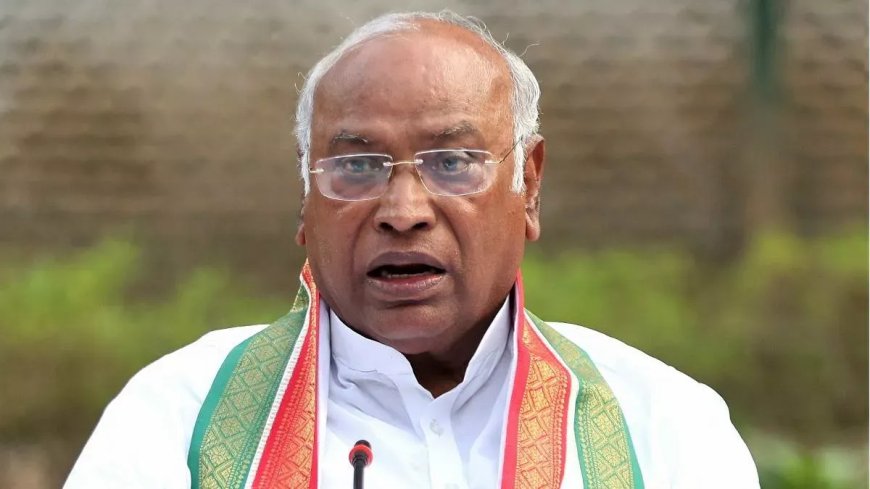Mallikarjun Kharge Launches Scathing Attack on Modi Government's 11-Year Record
Congress President Mallikarjun Kharge criticizes the Modi government over its 11-year tenure, highlighting key failures in economy, unemployment, and democracy. A comprehensive political analysis with credible sources and expert insights.

In a powerful and direct critique, Congress President Mallikarjun Kharge has sharply denounced the performance of the Narendra Modi-led government over the past eleven years, calling it a period marked by “institutional weakening, rising inequality, and democratic erosion.” Kharge, who has steadily emerged as one of the leading voices of opposition in Indian politics, delivered these remarks during a press briefing in New Delhi on Sunday, sparking renewed debate about the government's long-term track record.
His statements, backed by a trove of data and observations, have found resonance among political analysts, opposition leaders, and even sections of the general public growing increasingly wary of rising costs, unemployment, and concerns over civil liberties.
Economy, Unemployment, and Crony Capitalism at the Forefront
One of Kharge’s most pointed criticisms was aimed at the state of the Indian economy. He referred to rising unemployment rates and skyrocketing prices of essential commodities, arguing that these indicators reflect a failure of economic policy under the BJP government.
“What has 11 years of Modi rule given us? Record-high youth unemployment, back-breaking inflation, and the handing over of national assets to a few corporate allies,” Kharge remarked, referencing data from the Centre for Monitoring Indian Economy (CMIE), which reported a concerning rise in joblessness across several states in recent months.
He also criticized the alleged nexus between the government and corporate giants, reiterating opposition claims of “crony capitalism,” particularly in the wake of controversies involving the Adani Group, which has seen massive expansion during the Modi years.
Democratic Institutions and Free Press "Under Threat"
Kharge emphasized the increasing centralization of power, alleging that key democratic institutions like the Election Commission, Enforcement Directorate, and even the judiciary were being pressured or manipulated to suit political ends. He referenced credible reports by bodies such as Freedom House and Reporters Without Borders which have downgraded India's rankings in global democracy and press freedom indices respectively.
“We are witnessing not just the erosion of democratic values but their deliberate dismantling. From arrests of journalists to misuse of investigative agencies against political opponents — this is not the democracy we fought for,” he added.
Social Polarization and Divisive Politics
Another core aspect of Kharge’s critique centered on social polarization. He accused the Modi government of fueling communal tensions and failing to maintain harmony across communities.
Political observers have also pointed to the government’s handling of communal violence and religious rhetoric in election campaigns, drawing attention to instances like the Delhi riots in 2020 and increasing lynching incidents since 2014.
A Contrast to the Congress Era?
In defending his party’s own legacy, Kharge highlighted several Congress-era initiatives — from RTI and MNREGA to economic liberalization and rural healthcare expansion. He emphasized that Congress governments, despite their flaws, had “built institutions,” while the BJP government was “breaking them down.”
This forms a broader narrative that the Congress is increasingly adopting ahead of the 2024 general elections — presenting itself as the defender of India’s constitutional values, in contrast to what it calls the authoritarian drift under BJP.
Media Reaction and Public Discourse
The media response has been mixed. While some national outlets have covered the remarks prominently, several Kharge supporters and independent media voices argue that mainstream platforms are downplaying critical opposition commentary. Digital-first platforms like The Wire, Scroll, and The Quint have provided more extensive coverage and contextual analysis.
The reactions from BJP leaders were swift. Union Home Minister Amit Shah and BJP spokespersons dismissed Kharge’s statements as “baseless” and accused the Congress of “hypocrisy,” citing corruption and dynastic politics during its own tenure.
What's Next?
With general elections less than a year away, Kharge’s strategic remarks underscore the Congress’s evolving approach — more aggressive, data-backed, and sharply focused on the failures of the ruling regime. The party appears poised to make this narrative a cornerstone of its campaign strategy.
Meanwhile, the broader public discourse is also evolving. While die-hard supporters of both sides remain unchanged in their loyalties, the undecided middle class, facing inflation and job insecurity, could emerge as the key demographic that decides the outcome in 2024.
Conclusion: A Political Reset or Repeat?
Kharge’s remarks serve not only as an indictment of the Modi government’s track record but also as a call for political accountability. Whether this critique gains traction at the grassroots or gets buried under the weight of political polarization remains to be seen.
But one thing is clear — the next electoral cycle is shaping up to be one of the most contentious in recent memory, with high stakes for both governance and the democratic character of the nation.














